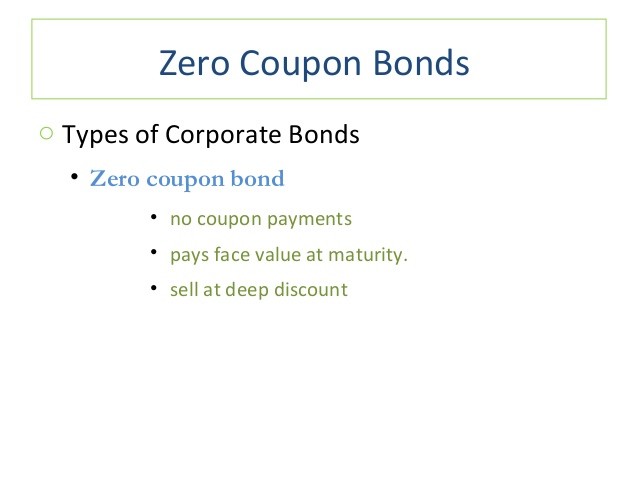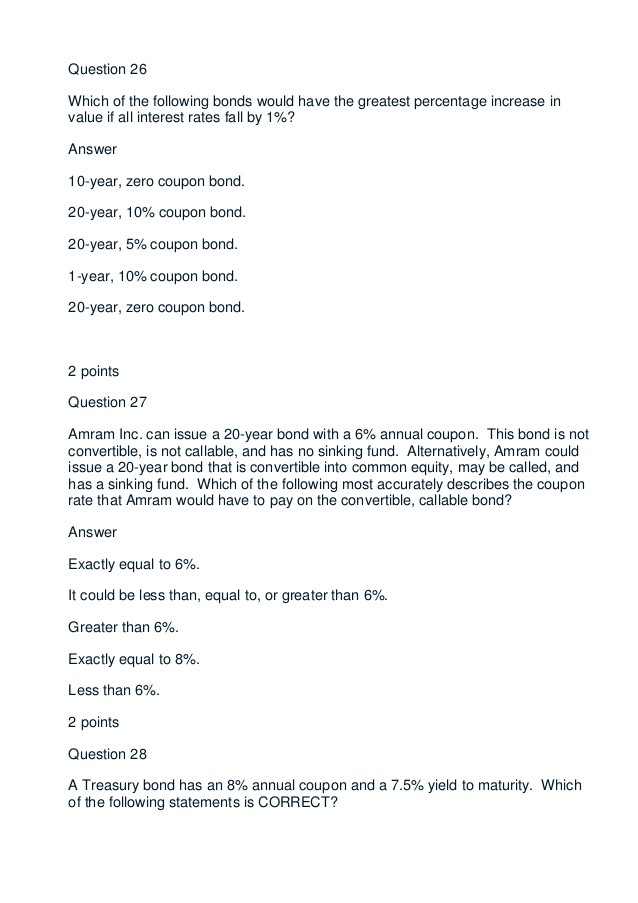Zero Coupon Bonds_2
Post on: 8 Апрель, 2015 No Comment

by Doris Dobkins
Are you enjoying the ups and downs of the stock market these past few days or does it make you a little nervous. Maybe you don’t mind the ups and downs so much with your play money, but what about the important things like retirement funds or your children’s college education fund?
If you are looking for a safe way to put some money aside and want to know exactly how much money you will have in a specific number of years, try investing in zero-coupon bonds. Zero coupon bonds also pay slightly higher rates than traditional bonds, bank CD’s and money market accounts. Many people like to invest in the riskier type funds when they are younger and then as they get closer to retirement and paying their children’s education costs, they tend to shift these higher risk investments into more stable but lower yielding bonds.
If you know you will need a new car in five years or will be making a final balloon payment on a vehicle or mortgage, zero- coupon bonds are a great dependable alternative to playing the stock market. You can also purchase zero-coupon bonds on a regular basis, once or twice a year so that they will provide a steady income as they come due in future years.
There are three basic kinds of bonds with some variations to each. They are: corporate, municipal and Treasury. Bonds are also known as debt investment. Bonds are created when a corporation, municipality, the U.S. government or an agency of the government goes into debt to borrow money. An entity then sells what is known as a bond, and guarantees you a fixed rate of interest for a specific period of time. The interest is paid to the investor on a regular basis, whether it is monthly, semi- annually, or whatever the terms of the bond dictates. Then when the bond matures at the specified date, the issuer gives the original amount of money back to the investor.
Zero coupon bonds have been one of the most popular bonds for the last two decades. They are different than other bonds because the interest from the coupon rates is not paid out to the investor but stays in the bond and earns interest at the same coupon rate. This is a great feature. For example, if you bought a bond with a coupon rate of nine percent nine years ago, every time the bond paid you the nine percent interest payment it is reinvested at that same higher rate of nine percent. If interest rates dropped, it might be difficult to find a fund paying nine percent to reinvest the money into. With a zero coupon bond, you could continue to invest the interest at the coupon rate throughout the life of the bond.
When you buy a regular corporate, municipal or Treasury bond, you will pay full price for the bond (its face value), then receive interest payments (which are also called its coupon) over the life of the bond. The number of payments per year depends on the bond. Most of them pay semiannually. With the zero coupon bond, you buy the bond at a discount from its face value but you don’t receive any payments (zero coupon). The interest is reinvested into the bond so you received the full face value of the bond at maturity. So a zero-coupon Treasury bond that pays you $10,000 in 10 years would cost about $5,500 today with a 6.2 percent rate.
Some risks and things to watch out for with bonds: If interest rates rise and you sell your bond before it matures, you could get less money than what you paid for it. Also, corporations and municipalities may default on their bonds, or not pay interest or principal when it is due. Another thing to be aware of with bonds is what is known as the call feature. This is how issuers of bonds protect themselves if the interest rates come down after they issue a bond. It allows them to cut their losses by calling that particular bond in, paying off the investors and then issuing a new bond at a lower interest rate. So you would have to find another bond to invest in at that time and it probably won’t pay as much as the previous bond. Treasury bonds seldom have this call feature but beware of it in municipal bonds and corporate bonds.
Another thing to beware of is the fact that the interest on zero coupon bonds is taxable and is considered current income even though it is reinvested. Two ways to avoid this is to purchase your zero coupon bonds in your tax-deferred retirement account or buy a tax-free municipal (Munis) zero coupon bond. Municipal Bonds are taken out with a state, county, or local agency. Generally they are tax-free on the federal income tax level. If you buy a municipal bond from your state you can also avoid state income tax. The yield is usually lower compared to other bonds because of the tax-free benefits. If you are in a higher tax bracket, that may be an important benefit and factor in your financial planning.

It is also a good idea to get insurance when you buy a zero coupon bond since the interest is not being paid to you. If the bond defaulted, you would receive absolutely nothing without insurance.
Bonds are an important part of every financial portfolio. Take some time to learn the fundamentals and then include them in your financial plan. Happy investing.
Doris Dobkins is a money saving expert, author and speaker and has helped thousands of people find ways to save money and get out of debt.
Take the Next Step
- Are you getting the best CD rate? Use our simple tool to find out. It’s completely private, extrememly simple and you’ll know what rate is available to you in seconds!
- Compare money market rates with our best rate finder. Don’t let your bank pay you less than you deserve. It only takes a minute and your privacy is completely protected.














